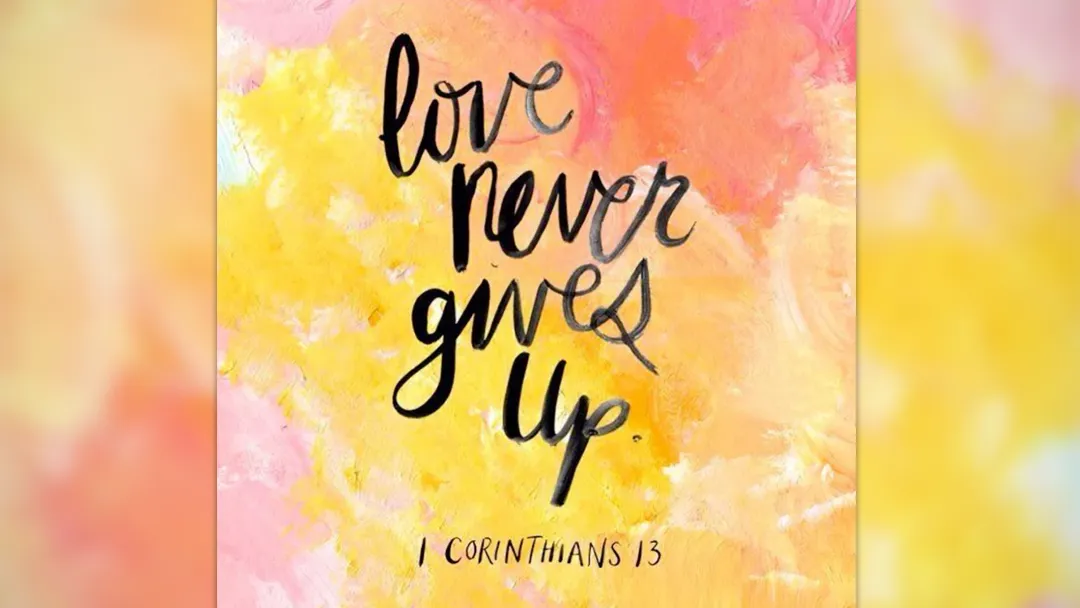Does love always win? That question has been asked by many people who have experienced a lot of pain in relationships. Ask the wife who has just received news that her husband has been unfaithful to her. Ask the abused child what kind of love they received from a parent who violated them. Ask the parent of a child who has run away from home with someone of the opposite sex. In asking these people if “love always wins” undoubtedly one will get some negative answers.
In order to properly answer the question does “love always win?”, a close look at love is needed. Specifically, I want to share my former view of love and a crisis of love;
My former view of love was simple “there was no such thing as true love.” My former view of love was based upon my dysfunctional relationship with my parents. Moreover, I thought love was conditional-the more I do for others the more I received from them. My faulty view of love rarely allowed me to experience deep relationships. To me, the answer to the question does
“Love Always Win? Was no. However, I came to a point in my life in which I experienced “a crisis of love.” This “crisis of love” was necessary in order for me to properly understand love. What was the “crisis of love/” The crisis of love came about from pain. That’s right! Pain. I experienced so much pain in my life that I needed some kind of relief. Drugs, alcohol and other addictions did not satisfy. I was looking for “if it existed” I thought, true love. I was in “a crisis of love.”
There have been others face a “crisis of love.” I want to share a true story by David C. Needham entitled, “For My Sister.” It goes as follows:
There is a true story of a little boy whose sister needed a blood transfusion. The doctor explained that she had the same disease the boy had recovered from two years earlier. Her only chance of recovery was a transfusion from someone who had previously conquered the disease. Since the two children had the same rare blood type, the boy was an ideal donor.
“Would you give your blood to Mary?” the doctor asked. Johnny hesitated. His lower lip started to tremble. Then he smiled and said, “Sure, for my sister.”
Soon the two children were wheeled into the hospital room. Mary, pale and thin. Johnny, robust and healthy. Neither spoke, but when their eyes met, Johnny grinned.
As the nurse inserted the needle into his arm, Johnny’s smile faded. He watched the blood flow through the tube.
With the ordeal almost over, Johnny’s voice, slightly shaky, broke the silence. “Doctor, when do I die?”
Only then did the doctor realize why Johnny had hesitated, why his lip had trembled when he agreed to donate his blood. He thought giving his blood to his sister would mean giving up his life. In that brief moment, he had made his great decision.
Johnny faced a “crisis of love”. He won the test and experienced love at the deepest level.
The next story that illustrates a “crisis of love” told by Philip Yancey entitled, “ A Crumpled Photograph.” It goes as follows:
One holiday I was visiting my mother, who lives seven hundred miles away. We reminisced about times long past, as mothers and sons tend to do. Inevitably, the large box of old photos came down from the closet shelf, spilling out a jumbled pile of thin rectangles that mark my progression through childhood and adolescence: the Cowboy-and-Indian getups, the Peter Cottontail suit in the first grade play, my childhood pets, endless piano recitals, the graduations from grade school and high school and finally college.
Among these photos I found one of an infant, with my name written on the back. The portrait itself was not unusual. I looked like any baby: fat-checked, half-bald, with a wild, unfocused look to my eyes. But the photo was crumpled and mangled, as if one of those childhood pets had got hold of it. I asked my mother why she had hung onto such an abused photo when she had so many other undamaged ones.
There is something you should know about my family: when I was ten months old, my father contracted spinal lumbar polio. He died three months later, just after my first birthday. My father was totally paralyzed at age twenty-four his muscles so weakened that he had to live inside a large steel cylinder that did his breathing for him. He had very few visitors, but the one visitor who came faithfully, my mother, would sit in a certain place so that he could see her in a mirror bolted to the side of the iron lung.
My mother explained to me that she kept the photo as a memento, because during my father’s illness it had been fastened to his iron lung. He had asked for pictures of her and of his two sons, and my mother had to jam the pictures in between some metal knobs. Thus, the baby photo. I rarely saw my father after he entered the hospital, since children were not allowed in polio wards. Besides, I was so young that even if I had been allowed in, I would not now retain those memories.
When my mother told me the story of the crumpled photo, I had a strange and powerful reaction. It seemed odd to imagine someone caring about me whom, in a sense, I had never met.
During the last months of his life, my father had spent his waking hours staring at those three images of his family, my family. There was nothing else in his field of view. What did he do all day? Did he pray for us? Yes, surely. Did he love us? Yes. But how can a paralyzed person express his love, especially when his own children are banned from the room?
I have often thought of that crumpled photo, for it is one of the few links connecting me to the stranger who was my father, a stranger who died a decade younger than I am now. Someone I have no memory of, no sensory knowledge of, spent all day every day thinking of me, devoting himself to me, loving me as well as he could. Perhaps, in some mysterious way, he is doing so now in another dimension. Perhaps I will have time, much time, to renew a relationship that was cruelly ended just as it had begun.
I mention this story because the emotions I felt when my mother showed me the crumpled photo were the very same emotions I felt that February night in a college dorm room when I first believed in a God of love. Someone is there, I realized. Someone is watching me. It was a startling feeling of wild hope, a feeling so new and overwhelming that it seemed fully worth risking my life on.
Philip Yancey experienced “a crisis of love.” He won the test and experienced love at the deepest level.
Friends, love is not a hedonistic pursuit of life. Nor is love self-seeking. Love by the very nature gives and gives all there is to give of one’s self. Mother Teresa described love this way in “Garment of Love” “Love has a hem to her garment that reaches the very dust. It sweeps the streets and lanes, And because it can, it must.”
The greatest example of love ever shown was God’s gift of His Son to you. Ask to receive the Gift of Love and you will know “Love Always Wins.”




0 Comments